WASHINGTON, D.C. -- An average of 13% of adults worldwide rated their lives poorly enough to be considered "suffering," according to Gallup surveys in 146 countries in 2011. The percentage rating their current and future lives poorly enough to be considered suffering was as high as 45% in Bulgaria and as low as 1% or less in the United Arab Emirates, Netherlands, Luxembourg, Canada, Thailand, and Brazil.
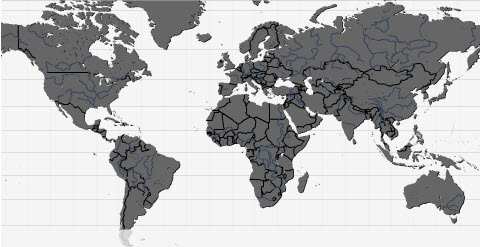
Gallup classifies respondents as "thriving," "struggling," or "suffering" according to how they rate their current and future lives on a ladder scale with steps numbered from 0 to 10 based on the Cantril Self-Anchoring Striving Scale. Gallup considers people to be suffering if they rate their current lives a 4 or lower and their lives in five years a 4 or lower. The respondents do not label themselves as suffering. Average global suffering has remained relatively unchanged over the past several years.
One in four or more residents in 18 countries rated their lives poorly enough to be classified as suffering. Bulgaria had the negative distinction of leading the global suffering list, as it did last year. Yemen, Armenia, and El Salvador followed closely behind, with one in three or more residents suffering in each of these countries.
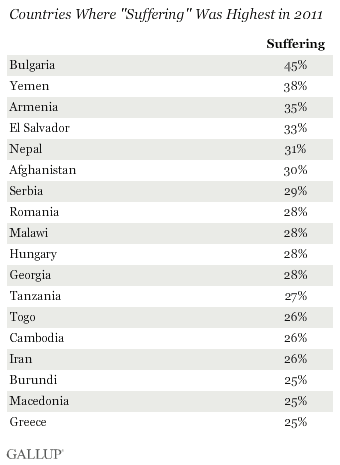
The countries where suffering is highest are primarily a mix of European, African, and Asian nations. This list heavily features several European nations that the global financial crisis has adversely affected and where leaders have responded with austerity measures. Several are also former socialist societies, including Bulgaria, Armenia, and Serbia.
Suffering spiked in places such as Iran, Afghanistan, and El Salvador last year -- earning them a spot near the top of the world's most suffering list.
Suffering was 3% or less in 24 countries -- most of them wealthier and more developed countries. Three percent of Americans were suffering in 2011, as has been the case in past years.
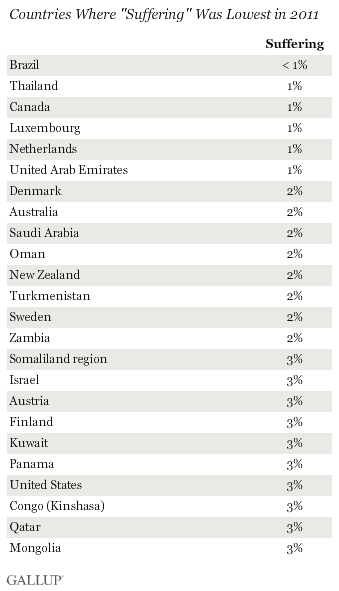
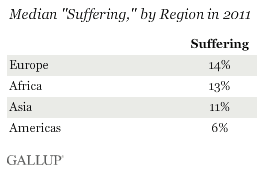 Suffering Lowest in the Americas
Suffering Lowest in the Americas
A median of 14% of residents in Europe were suffering last year, followed by 13% in Africa, and 11% in Asia. Median suffering was lowest in the Americas at 6%.
Still, within regions, suffering varies greatly. Although median suffering is 14% in Europe, many European nations boast among the lowest rates of suffering in the world.
These, however, are mainly northern, western, and central European countries. Southern and Eastern Europe does not fare as well. In Africa, suffering is as low as 2% in Zambia, but climbs as high as 28% in Malawi.
Suffering Relatively Stable in Most Countries
For the most part, suffering changed little at the country level in 2011 compared with 2010. However, in a handful of nations, Gallup did find shifts in suffering last year. Suffering increased the most in El Salvador, climbing to 33% in 2011 from 9% in 2010. Suffering declined the most in Macedonia, falling 25 percentage points last year from 38% in 2010.
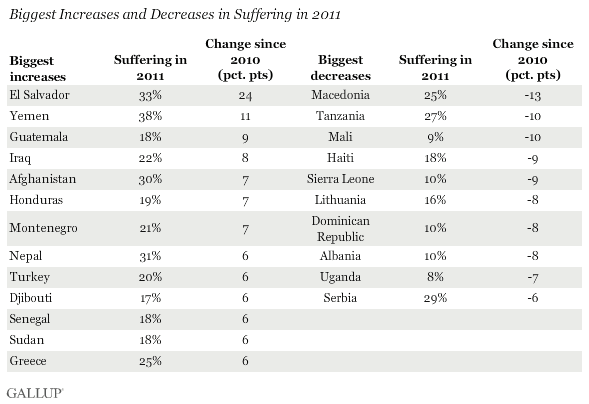
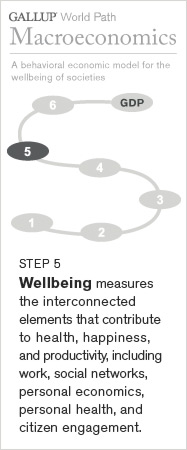 |
Implications
Individuals who are suffering are not only pessimistic about their current standing in life, but also lack hope about what their future holds. It is clear in many nations that are struggling economically and politically and where stability is tenuous, such as in Afghanistan, Iran, and Greece, that sizable proportions of the population are suffering.
Those who rate their lives highly enough to be thriving are much more likely to be healthy, happy, and engaged in society. It is important for leaders in nations where suffering is highest to take a hard look at what they must change in their countries to improve how their people perceive their own lives and their future. As outlined in Gallup's macroeconomic path to achieving GDP growth, leaders must focus on ensuring all citizens feel a sense of law and order, have food and shelter, believe national institutions are functioning properly, and be able to secure good jobs to increase the well-being of residents in their countries.
For complete data sets or custom research from the more than 150 countries Gallup continually surveys, please contact SocialandEconomicAnalysis@gallup.com or call 202.715.3030.
Survey Methods
Results are based on face-to-face and telephone interviews with approximately 1,000 adults per country, aged 15 and older, conducted in 2011 in 146 countries. Results in Russia, Tunisia, Egypt, the United Arab Emirates, Saudi Arabia, Qatar, Lebanon, Morocco, Jordan, the Palestinian Territories, Bahrain, Yemen, Comoros, Somaliland region, and Iraq are based on data aggregated from multiple surveys. For results based on the total samples, one can say with 95% confidence that the maximum margin of sampling error ranges from ±1.7 percentage points to ±5.7 percentage points. The margin of error reflects the influence of data weighting. In addition to sampling error, question wording and practical difficulties in conducting surveys can introduce error or bias into the findings of public opinion polls.
For more complete methodology and specific survey dates, please review Gallup's Country Data Set details.
